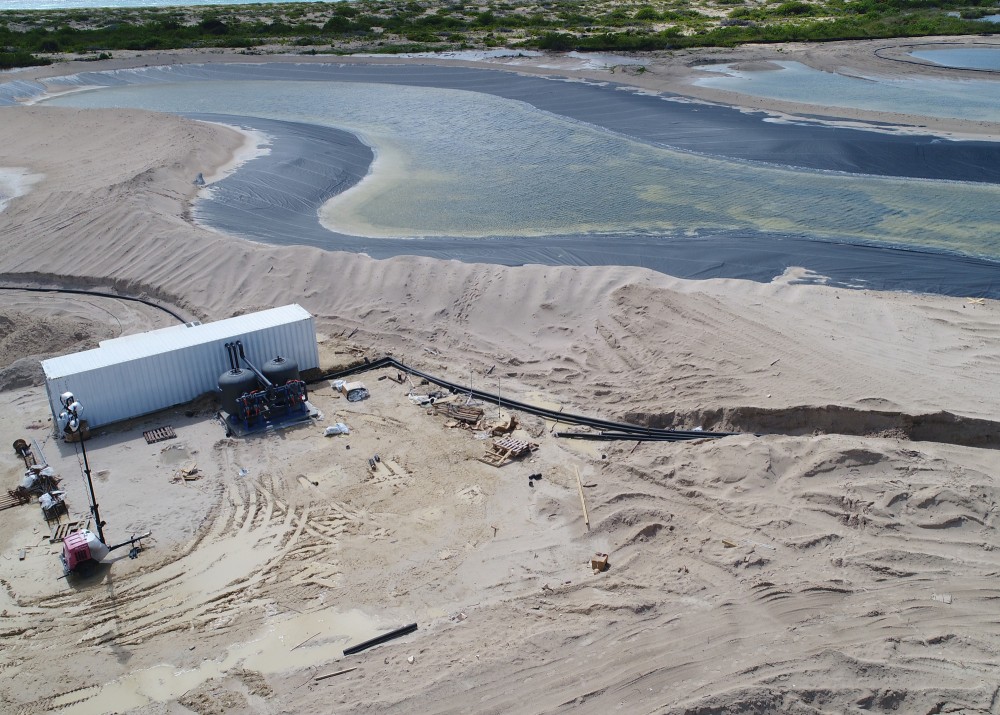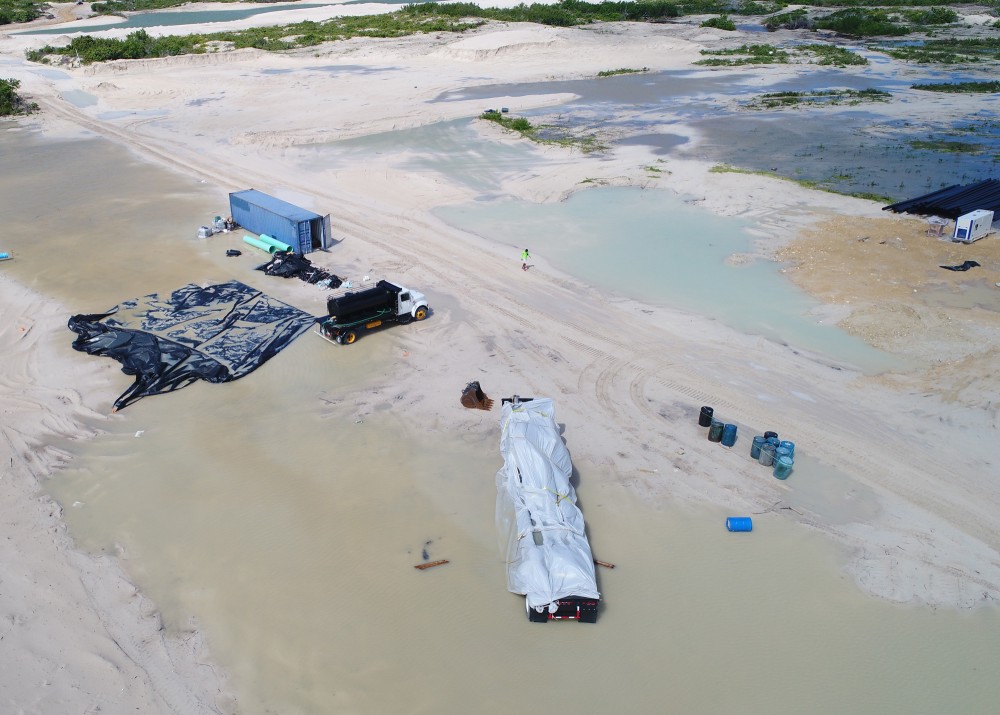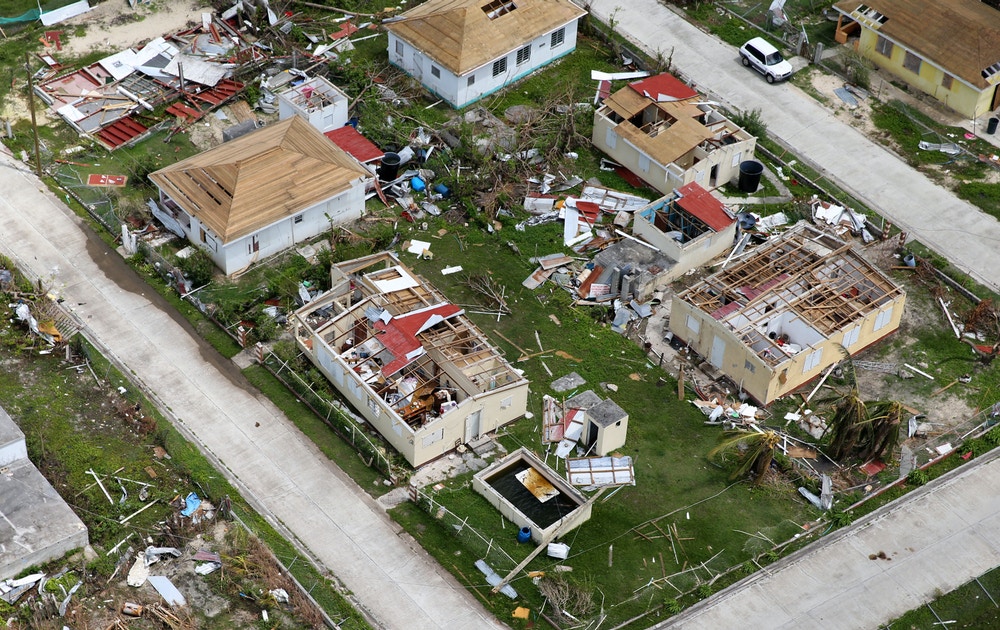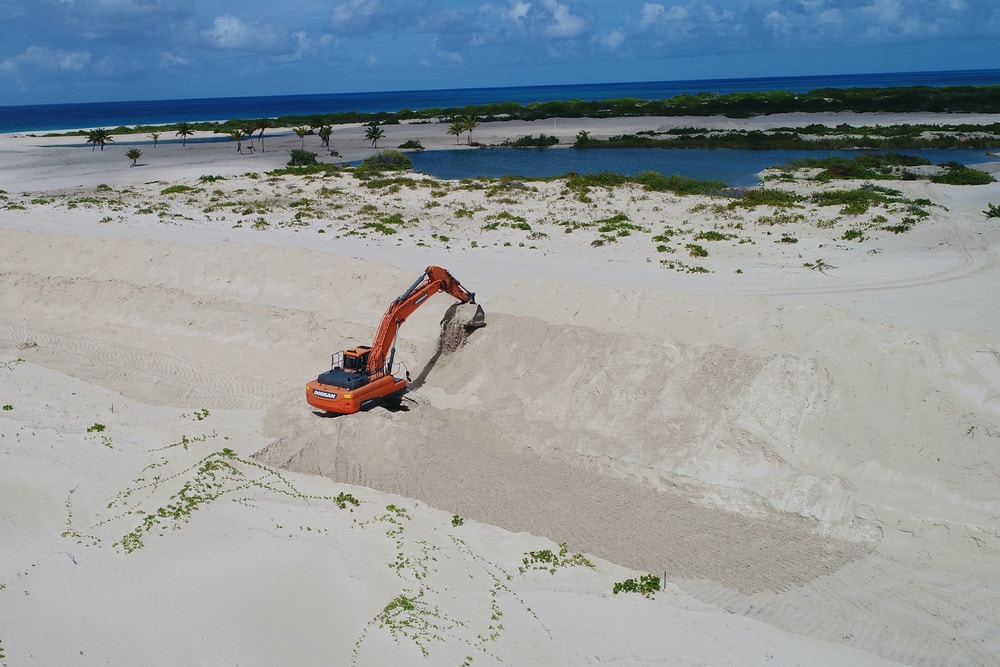Residents of the tiny Caribbean island of Barbuda say a planned luxury resort co-owned by the billionaire philanthropist and self-proclaimed environmentalist John Paul DeJoria could destroy the islanders’ way of life. DeJoria’s development company would place a golf course and community of seaside vacation homes on top of a wetland protected by an international treaty.
Recognized as vital in a future marked by climate crisis, the lagoon’s mangroves, seagrass beds, and coral reefs support a lobster fishery, endangered hawksbill and leatherback turtles, and the largest nesting colony of magnificent frigatebirds in the Western hemisphere. The vegetation also helps protect land from eroding during increasingly severe storms, such as Hurricane Irma, which destroyed the island in 2017.
Locals, who are citizens of the sovereign nation of Antigua and Barbuda, are also raising concerns that the resort constructed by DeJoria’s company Peace, Love and Happiness is playing a role in upending the island’s collective land ownership system, which has survived since slavery’s abolishment.
John Paul DeJoria, co-founder of Patrón Spirits International AG, speaks during a Bloomberg Television interview in New York, on Jan. 24, 2018.
Photo: Christopher Goodney/Bloomberg/Getty Images
“It’s being done at the expense of people’s lives,” said John Mussington, a Barbudan school principal and marine biologist. The island’s fisheries and its collective land ownership system have been vital to Barbudans’ resilience throughout the coronavirus pandemic, he noted, offering food and housing security in a place where lobster is abundant and eviction tends to be a nonissue. “The philanthropy these persons hide behind, it’s not real — it’s just an excuse so they can continue what they’re doing.”
On Wednesday, the Global Legal Action Network filed a complaint to the secretariat that oversees the Ramsar Convention, a treaty that recognizes wetlands of international importance. The complaint, which was filed on behalf of the Barbuda Council, the governing body that oversees internal affairs on the island, alleges that construction has already damaged the Codrington Lagoon. The Barbuda Council and the Global Legal Action Network are demanding that the Ramsar Secretariat, which has little enforcement power, pressure the government of Antigua and Barbuda to stop any construction on the lagoon. (The Antigua and Barbuda national government, which is based on larger, nearby Antigua, did not respond to requests for comment.)
“This will leave the Barbuda people more vulnerable to the impacts of climate change having decimated all the natural defenses.”
“Failure to stop the project in its current form will result in the destruction of the Codrington Lagoon National Park and Ramsar Site,” the complaint quoted Barbuda Council environmental adviser Adelle Blair as saying in a report to the council. “This will leave the Barbuda people more vulnerable to the impacts of climate change having decimated all the natural defenses, seriously threatening its livelihood base and survival, to make way for a place for the rich to live and play golf.”
In a statement emailed to the The Intercept, the project president for the development, Justin Wilshaw, told The Intercept that the Ramsar complaint had it backward. “The PLH project has had no impact on the Codrington Lagoon,” he said. Wilshaw claimed, instead, that it is the Barbuda Council that has allowed environmental destruction in the Ramsar-protected area, through sand-mining and other commercial ventures. He told The Intercept that the project developers are restoring, rather than destroying, the wetlands and that the project actually has wide support on the island: “PLH acknowledge that the Barbuda Council are still the process of understanding the benefits of foreign investment, while its general population have been quicker to adapt and benefit from engaging with PLH to open new businesses and take advantage of programs we offer to invest in their homes and future.”
Barbuda Council secretary Paul Nedd said that the local government does mine sand but not on the most sensitive parts of the shoreline.
The project is one of two large developments — for tiny Barbuda, at least — to benefit from a series of disaster capitalism-style legal maneuvers advanced in the aftermath of Hurricane Irma, as Barbudans fled wholesale destruction. The other project is being led by actor and hotelier Robert De Niro, who plans to build a tony resort called Nobu Beach Inn on a different stretch of sand. Though the Nobu Beach Inn will not be located on the Codrington Lagoon, locals have decried both projects as part of a “land grab” — enabled by a pro-development government in Antigua that lured the resorts in and rammed through a post-hurricane change in land laws that turned the projects into significantly more attractive investments.
Barbudan leaders told The Intercept that they had not heard much recently about De Niro’s project, formerly known as Paradise Found, but this month the acclaimed actor again began publicly promoting the development. “I knew that if I were going to build something like this,” he told Town and Country, “I would have to find the perfect place.” (De Niro’s Nobu Hospitality, which runs luxury properties across the globe, did not respond to a request for comment.)
Although it may be pristine and remote, Barbuda is not a place that’s empty of people. Along with DeJoria, said Mussington, “Robert De Niro is part of the scheme to change Barbuda’s communal land system to facilitate speculative real-estate ventures.” The luxury projects, he added, “are designed to convert the people’s land and resources into more billions of dollars for their personal bank accounts.”


An aerial view of the construction site is seen on Ramsar-listed Codrington Lagoon National Park in Barbuda, on Oct. 10, 2020.Photo: Obtained by Global Legal Action Network
Peace, Love and Happiness
DeJoria, who amassed a $2.7 billion fortune as the co-founder of such brands as Patrón Tequila and John Paul Mitchell Systems hair care, has fashioned himself as a philanthropist and environmentalist. He sits on the board of trustees of the clean water nonprofit the Waterkeeper Alliance. In 2017, Sea Shepherd, the marine conservation organization known for using boats to physically block poachers from harvesting whales and other sensitive species, named a vessel after DeJoria — which he christened with a bottle of Patrón Tequila, a brand he sold to Bacardi a year later in a $5.1 billion deal.
DeJoria described his resort as a means to help local fishermen who had sacrificed their livelihood in order to protect the environment. “There’s about 30 families (on the island) there that depend on fishing, and they average about $10,000 a year,” DeJoria was quoted as saying in a post on Sea Shepherd’s website. “We … are going to (help them with their income) for a full year until a resort is built and they have regular work. This way we find other work for those people.” His foundation shares the name Peace, Love and Happiness with the development company financing the Barbudan resort.
“It is alleged that he believes in protecting the environment,” Nedd said of DeJoria. “But here in Barbuda, he is the head of an organization that is seemingly causing major destruction to an environment. And not only the environment — major destruction to a people’s life, to an entire community.”

Photo: Jose Jimenez Tirado/Getty Images
Post-Hurricane Land Grab
The island of Barbuda’s tiny population is made up of descendants of enslaved people. After emancipation in 1834, they began practicing a form of collective land ownership and management that has endured since and was codified in 2007 by the national government. The system has helped assure that Barbuda does not turn into the environmentally destructive mass tourism hub that Antigua has come to represent, with huge cruise ships docking daily before the pandemic.
The Barbuda Land Act repeal appeared designed to support DeJoria and De Niro’s resort plans. Both of would-be developers signed agreements before the 2018 repeal that included clauses accounting for the possibility that the Land Act could be changed.
In 2016, Barbudans voted to approve DeJoria’s Peace, Love and Happiness project. However, project opponents argue that the plan presented at that time did not provide a full picture of the potential environmental impact. The 2017 lease, signed by a previous council chief from the same party as Antigua and Barbuda Prime Minister Gaston Browne, included a suspicious clause. It noted that, in line with the Barbuda Land Act, the vacation residences would be leased, not owned, “absent new legislation to the contrary.”
In the immediate aftermath of Hurricane Irma, Browne, whose premiership is seen to be aligned with developers, rammed through a repeal of the Barbuda Land Act, allowing Barbudans to individually purchase their land and eliminating a rule that said leases for major developments must be approved by the Barbuda Council and the majority of the Barbudan people. Browne claimed that individual land ownership would allow the Barbudans to access bank loans for hurricane recovery — a justification with historical precedence in the U.S. government’s late 19th century efforts to undo Native Americans’ collective land ownership systems through the General Allotment Act, a prelude to further dispossession and extractive industry development.
Project president Wilshaw said that the Peace, Love and Happiness beach residences are being leased, not sold, even after the law’s repeal.
Browne, who often refers to Barbudan communal land ownership as a “myth,” recently shifted his justification for allowing DeJoria’s development, now calling it an aid in battling the effects of the pandemic. “It will be the largest project in Antigua and Barbuda’s history when it is completed,” he told reporters after visiting the site in July. He claimed that people who lost their jobs because of the pandemic are already finding work building the resort: “At a time when there is a crisis, here is PLH in Barbuda employing people.”

Photo: Obtained by the Global Action Legal Network
Relief?
Barbudans are fighting in court to overturn the land law repeal, but in the meantime DeJoria’s project continues to move forward. Peace, Love and Happiness’s development partner, Discovery Land Company, has branded the project as the Barbuda Ocean Club, an “heirloom community where you can extend your legacy for generations to come.” A website for the development advertises a menu of seaside home designs, including a seven-bedroom “mangrove house,” with a swimming pool. A 2018 profile by Business Insider of Discovery Land Company’s founder, Mike Meldman, claimed that the Barbuda resort would “start as a hurricane relief effort re-building schools, hospitals, and infrastructure.”
Environmental problems related to the project have already been documented. At the end of August, the national Development Control Authority issued the project a notice of noncompliance with its environmental plan, citing “damage to the historic dune and palmetto vegetation.” Then, in October, a judge temporarily halted Peace, Love and Happiness construction in a sensitive area of the island so the court could consider a complaint by the Barbuda Council regarding the environmental risks. Since that time, Barbudans captured drone images earth-moving equipment continuing to work, according to the Global Legal Action Network.
The development president Wilshaw told The intercept that any work is being carried out in a part of the island that is not party to the court process and that PLH had filed its own injunction to stop the Barbuda Council from sand mining in the project area.
“The focus is on development. It is all about luxury property.”
Barbudan leaders do not trust the developers’ word, said Nedd, the council secretary, without some sort of outside observation to hold the builders to account. In September, Nedd and another council member were arrested as they attempted to access and inspect the leased area — something he argues he has the right to do as Barbuda Council secretary. He was accused of trespassing, disorderly conduct, and failing to wear a Covid 19-protective mask. The council members’ legal cases are currently on hold pending the resolution of the court case involving the construction injunction.
Nedd and others anticipate that the development will only leave them vulnerable to future crises. Two years after Hurricane Irma, a number of Barbudan families are still living in tents next to their still-destroyed homes, and hubs for services, such as the local police station, remain out of commission. Wilshaw said that the Peace, Love and Happiness developers have agreed to “refurnish” the police station and have provided a “clinic in a can” to support the damaged hospital, as well as rebuilding churches and basketball courts.
What Mussington sees is inaction from the national government. Rather than rebuild basic infrastructure, Mussington said the Antigua and Barbuda government is more interested in the priorities of people like DeJoria. “The focus is on development,” said the school principal. “It is all about luxury property.”
Alleen Brown | Radio Free (2020-12-09T13:03:21+00:00) Caribbean Islanders: “Environmentalist” Billionaire Building Resort on Protected Wetlands. Retrieved from https://www.radiofree.org/2020/12/09/caribbean-islanders-environmentalist-billionaire-building-resort-on-protected-wetlands/
Please log in to upload a file.
There are no updates yet.
Click the Upload button above to add an update.
